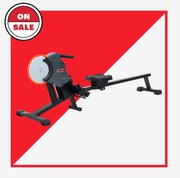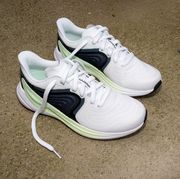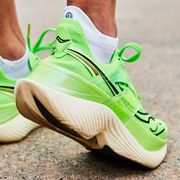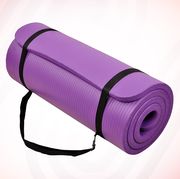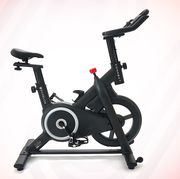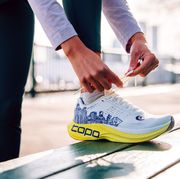"Should I or shouldn't I wear them?" Here are some guidelines to help you decide:
- Wear racing shoes to race faster. Research shows you'll run about 1-second-per-mile faster for every ounce that you shave off the weight of your running shoes. If you go from a 12-ounce training shoe to a 8-ounce racer, that's 4 seconds per mile. Or 12 seconds in a 5-K. Or as much as 1 minute, 45 seconds in a marathon. Not a lot in our opinion. But for some racers, every second counts.
- Wear racing shoes to feel faster. A race day is different from your other running days, and it's natural to want to make it feel special. You eat more carefully on race day, dress in lighter running clothes, and warm up more thoroughly. If you like the feel of sleek, speedy racing shoes on race days, go for it.
- Don't wear racing shoes if you need a lot of cushioning. Most racing shoes offer about 20 percent less cushioning than training shoes. If you need the extra cushioning, stick with your trainers.
- Don't wear racing shoes if you need extra support and stability. Racing shoes are light, because they don't include a lot of stability, support, and motion-control features. If you need these, you probably shouldn't wear racing shoes.
- Don't wear racing shoes if you're a big runner. Bigger, heavier runners tend to need lots of the cushioning and support features that racing shoes don't have. Play it safe. Race in training shoes that have proved successful for you.
- Wear racing shoes for 5-Ks and 10-Ks, then switch to trainers for longer races. The theory here is that you can't do much damage in the shorter races. So if you like having a pair of racing shoes in your closet, fine. Take them out for the short races. Leave them behind when you race a half-marathon or marathon.
- Don't wear racing shoes if you have a touch of pain or soreness. It would be easy for us to say "Don't race" when you have some muscle soreness. But we know you're going to anyway, at least in some situations. If you do, wear your training shoes to minimize muscle damage.
- Consider performance trainers instead of racing flats. A performance trainer is designed for fast training and long-distance racing. Most weigh about 10 ounces, which is midway between a training shoe and a racing shoe, and provide good cushioning and support. The perfect compromise for most road-race distances.





